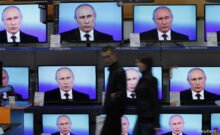(NYU Jordan Center) U.S. observers and policymakers have often seen Russian-origin media as responsible for influencing the opinions and worldviews of Russia’s post-Soviet neighbors. However, our analysis of surveys in Central Asia found little evidence for this influence.
Russian-origin media maintain a strong presence throughout much of the former USSR: produced for domestic audiences, but easily available abroad by cable or satellite, they offer high-quality miniseries, films, talk-shows, and political shows. Domestic media, often poor in funding and human capital, cannot always compete. This is especially the case in Central Asia, where authoritarian regimes fear media freedom and resources are especially scare, making their media realm particularly weak.
Central Asian states are also among the most supportive of Russia’s narratives within the post-Soviet space. In the past, U.S. analysts and policymakers have simply attributed this support to Russian media domination, a perception that has informed U.S. foreign policy for years.
However, available survey data provide little support for this claim. […]
Read More © NYU Jordan Center
Co-author: Dylan Royce











